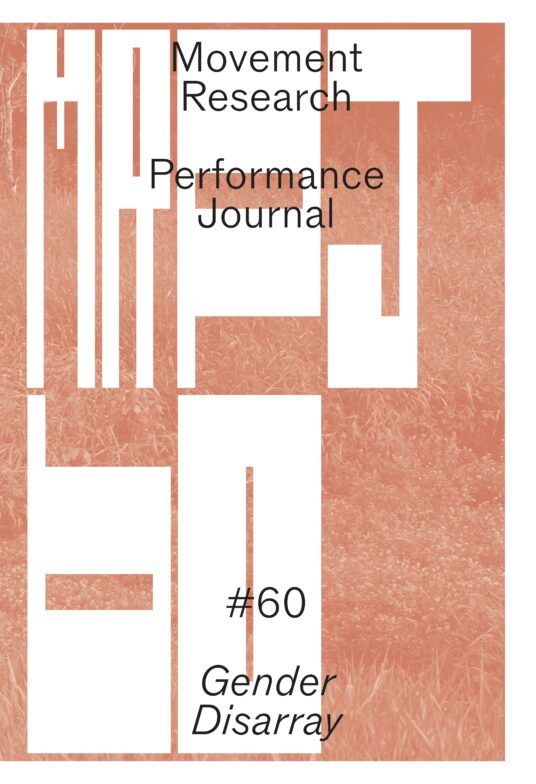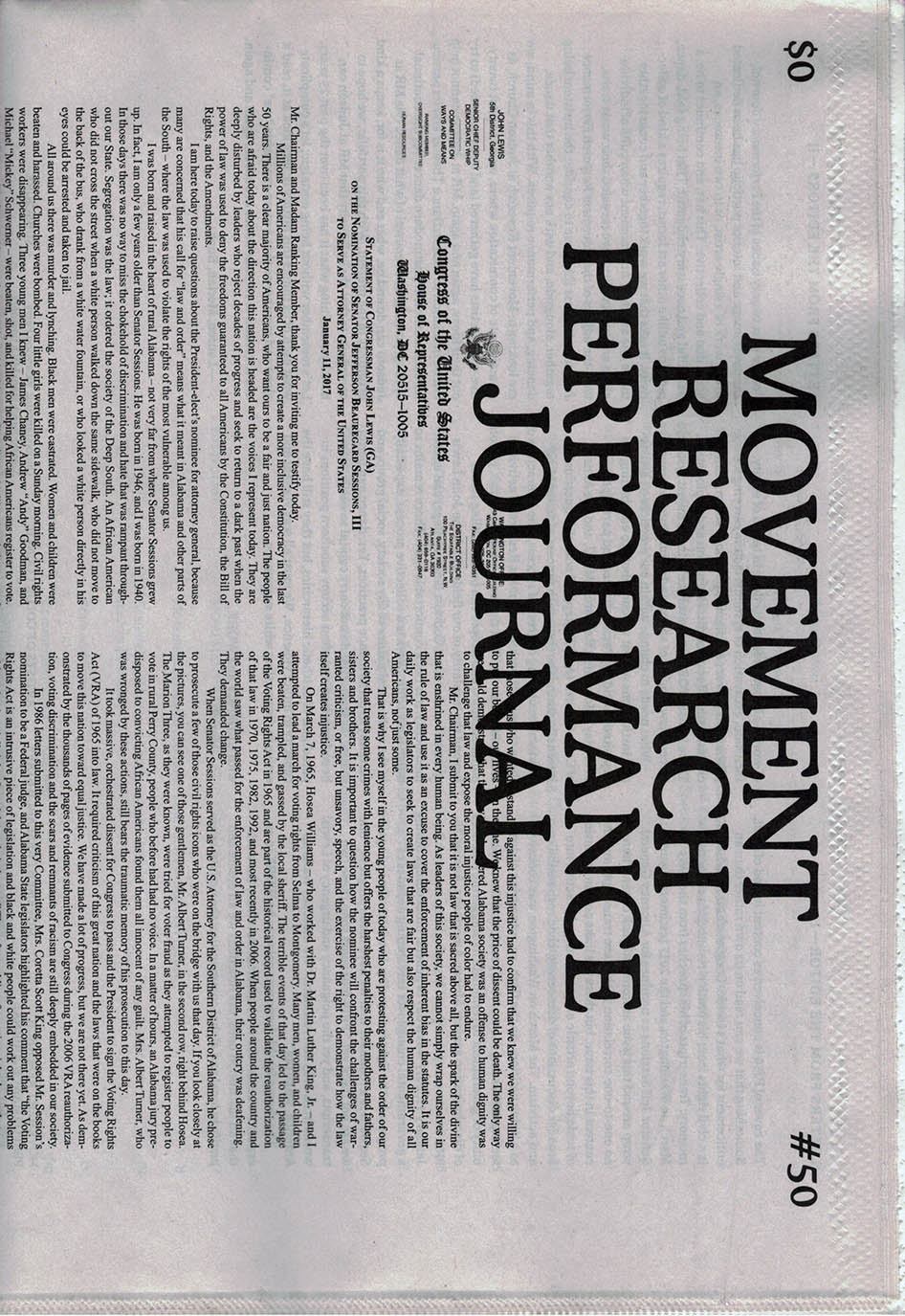Movement Research Performance Journal
Movement Research Performance Journal

Movement Research Performance Journal
Issue #60 - Gender Disarray
Kay Gabriel, Amalle Dublon and 2 more
Under the direction of four contributing editors—Amalle Dublon, Kay Gabriel, Keioui Keijaun Thomas, and Anh Vo— we’ve assembled a new body of work by mostly trans and queer artists reflecting on the keyword “gender” and its relation to contemporary performance. Their work moves across multiple genres of writing, from analytic essays to poetry to performance scripts.
“Read My Lips” is a phrase that will be familiar to longtime readers of the Movement Research Performance Journal—so familiar that the mere reference will bring to mind an image posted by the artist collective GANG, an image that lies at the heart of one of the journal’s most spectacular moments. Issue #3, with its focus “Gender Performance,” was published in 1991 amid that era’s Culture Wars, receiving almost immediately negative reception from government officials (the NEA threatened to withdraw funding from Movement Research) and many members of the dance community (who considered Issue #3 to be deliberately provoking the so-called “war,” intentionally taking a political position that some worried might comprise future funding of the field). In the thirty-three years since its publication, Issue #3 has developed a patina familiar to many artist-activist histories that are looked upon with romance and nostalgia, often by those for whom that history is only a fantasy (rather than a lived experience).

Movement Research Performance Journal
Issue #58/59
Lauren Bakst, Sorour Darabi and 1 more
Movement Research Performance Journal #58/59, explores notions of performance as “research”—a word intrinsic to our parent organization and its long history of supporting process over product. Contributing editors Sorour Darabi, Lauren Bakst, and Niall Jones, delve into themes of research, care, pedagogy, and protest in dance and performance across artistic and educational institutions.

Movement Research Performance Journal
MRPJ - Archive Issues
Different archive editions of the journal available to consult in our space (not for sale). With editions ranging all through the history of the journal.
Available issues :
#03
#05
#14
#15
#19
#20
#22
#26
#50

Movement Research Performance Journal
Issue #52/53 - Sovereign Movements
Movement Research announces Issue 52/53 of its print publication, the Movement Research Performance Journal. For this issue, Sovereign Movements: Native Dance and Performance, guest editor, choreographer Rosy Simas invited writer, Ahimsa Timoteo Bodhrán, to work with her. Together they assembled contributors from Native and Indigenous communities to reflect upon their practices, the historical conditions out of which they operate as well as movement, performance, and choreography as a socio-political project. Just as it is important for physical institutions to acknowledge that they sit upon occupied land of Native and Indigenous people, so too must institutions of history, practice, and epistemology acknowledge their occupation of knowledge and memory.
Throughout this issue, dance and movement is posited as a powerful strategy against settler-colonial mindsets and as an effective tool against erasure of Native and Indigenous cultural traditions. These pages discuss the importance of Native sovereignty and analyze various histories of resistance to settler-colonialism. Artists in the issue propose alternative artistic models to probe the roles of art and artists in society towards a more expansive constellation that fundamentally critiques the Western reward system in culture as well as the often celebrated cult of authorship.

Movement Research Performance Journal
Issue #54 - Spatial Practice
Movement Research announces Issue 54 of its publication, the Movement Research Performance Journal. Continuing to experiment with approaches that engage contemporary choreography and performance through the medium of print—poem, prose, image, interview and a wide range of formats give form to critical and self-reflexive discourses and material histories. Movement Research Performance Journal acts as a site of convergence between publication, editors, writers, designers, and artists to consider the place of dance, performance, and choreography in relation to the contemporary moment.
For MRPJ54: Spatial Practice, guest editor, artist Alan Ruiz invited contributors to examine the ongoing legacy of neoliberalism and the cultural production it engenders, specifically focusing on the relation between bodies and the built environment. Contributors have explored the contexts and histories in which we dwell, create, and coexist to interrogate how space is produced both as material and ideology during the hyper-development and hyper-exploitation of the urban environment, predominantly in New York City. Spatial Practice asks: how does this impact the bodies that labor and move to keep the kinetic machine of “progress” moving? Contributions offer multiple perspectives—through a variety of genres—on the ways in which the political project of neoliberalism has, in part, shaped the designation and use of public space as well as enthroned the philanthropic class and the cultural institutions associated with them. Alongside the consolidation of wealth and power, neoliberalism’s underlying insistence on individualism has also reinforced and normalized the braided conditions of capitalist exploitation, structural racism, and patriarchal domination. Unraveling this logic allows us to collectively imagine alternatives to the prevailing systems of property, dispossession, ableism, and incarceration that parcelize existence.
Contributions from:
Critical Resistance, Alan Ruiz, Lluís Alexandre, Casanovas Blanco, Julie Tolentino and Sadia Shirazi, Kaegan Sparks, Martha Rosler, Suzanne Stephens, Joshua Lubin-Levy, Lo-Yi Chan and Tim Hartung, Olive McKeon, Alice Sheppard, Biba Bell, Erik Thurmond, BRANDT : HAFERD, V. Mitch McEwen and Olivier Tarpaga, Sarah Oppenheimer, Jimmy Robert and Mario Gooden, Dominic Cullinan, Angela Davis J. Bouey and Melanie Greene, Lisa Nelson, Diana Crum, Kristopher, K.Q. Pourzal, Jess Barbagallo, John Hoobyar and Simon Asencio, Layla Zami, Cristiane Bouger, Daria Faïn and Marjana Krajač, Germaine Acogny, Helmut Vogt and André Zachery, Milka Djordevich and Tim Reid, Melanie Maar.